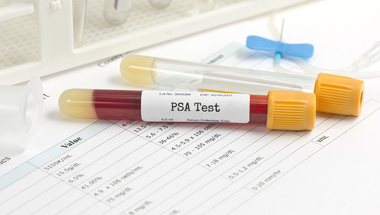BRCA genes and prostate cancer risk
What are BRCA genes?
BRCA1 and BRCA2 are two genes that everyone has. These genes are passed down from your parents (inherited). The function of the BRCA genes is to keep healthy cells growing normally and prevent the growth of cancer cells.
In a small number of people, these genes change and don’t work properly – this is called a gene variant. Your body can create these gene variants over time, or they can be inherited.
How many people have a BRCA gene variant?
In the general population, around 1 in 300 to 400 people have a BRCA gene variant.
People from an Ashkenazi Jewish background have a higher risk – around 1 in 40 people may carry a BRCA gene variant.
BRCA genes and my prostate cancer risk
Men with a BRCA2 gene variant have a higher lifetime risk of developing prostate cancer during their lifetime. If you have a BRCA1 variant, your lifetime risk of developing prostate cancer may only increase slightly. But the evidence remains unclear.
Some research suggests that having a BRCA1 or BRCA2 gene variant may also increase your risk of being diagnosed with prostate cancer at a younger age or having aggressive (more likely to spread) prostate cancer.
I have a BRCA gene variant, what should I do?
Having a BRCA variant doesn’t mean you will get prostate cancer, but your risk is higher, so speak to your GP. They can talk to you about your risk, and about the tests that are used to diagnose prostate cancer. You can also get in touch with our Risk Information Service, who can help you understand your risk of prostate cancer.
Prostate cancer screening
The UK National Screening Committee (UK NSC) has recently recommended that men aged between 45 and 61 with a known BRCA1 or BRCA2 gene variant (change) should be regularly screened for prostate cancer every two years.
Can I be tested for a BRCA gene variant?
Speak to your GP if you have any relatives with prostate cancer, breast cancer or ovarian cancer, as your risk of prostate cancer may be higher. You may be offered a spit or blood test to see if you have a BRCA gene variant. The NHS website has further information on genetic testing and genetic counselling.
NHS England is offering free BRCA gene testing for anyone living in England who is aged 18 or over and has one or more Jewish grandparent. For more information, visit the NHS Jewish BRCA Testing Programme Website.
References and reviewers
Updated: October 2025 | To be reviewed: December 2027
- Khan HM, Cheng HH. Germline genetics of prostate cancer. The Prostate. 2022;82(S1):S3–12.
- Nyberg T, Tischkowitz M, Antoniou AC. BRCA1 and BRCA2 pathogenic variants and prostate cancer risk: systematic review and meta-analysis. Br J Cancer. 2022 Apr 1;126(7):1067–81.
- Predictive genetic tests for cancer risk genes [Internet]. nhs.uk. 2017 [cited 2022 Jun 17]. Available from: https://www.nhs.uk/conditions/predictive-genetic-tests-cancer/
- Genetic and genomic testing [internet]. nhs.uk 2023 [cited 2025 Oct 31]. Available from: https://www.nhs.uk/tests-and-treatments/genetic-and-genomic-testing/
- Genetic tests to test your cancer risk [internet]. nhs.uk 2023 [cited 2025 Oct 31]. Available from: https://www.nhs.uk/tests-and-treatments/genetic-tests-for-cancer-risk/
This information has been reviewed by:
- William Ince, GP, Humbleyard Practice, Norfolk
- Samantha McBeigh, Uro-oncology Clinical Nurse Specialist, Belfast City Hospital
- Jonathan Rees, GP, Tyntesfield Medical Group, North Somerset
- our Specialist Nurses
- our volunteers.



